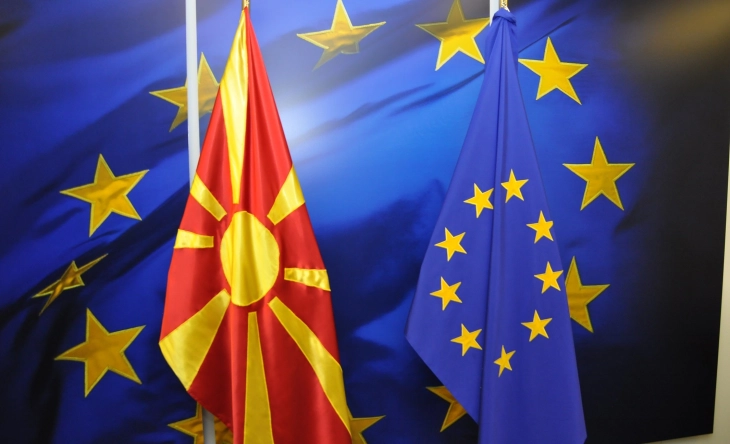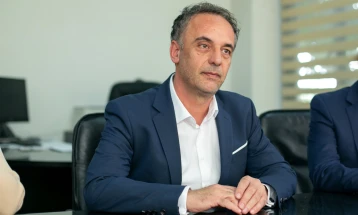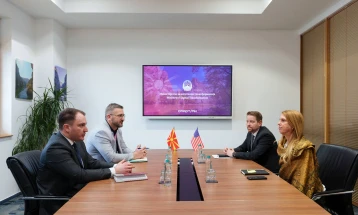EU to get back on track, focus on merit, not bilateral disputes, Mickoski says
- The European Union needs to get back on track, the merit-based track, and focus on achievements instead of bilateral disputes, Prime Minister Hristijan Mickoski told a news conference Monday held after his meeting with the Foreign Investors Council.

Skopje, 16 December 2024 (MIA) — The European Union needs to get back on track, the merit-based track, and focus on achievements instead of bilateral disputes, Prime Minister Hristijan Mickoski told a news conference Monday held after his meeting with the Foreign Investors Council.
Prime Minister Mickoski said the country could certainly be stalled on the way to the EU if it did not meet the EU's criteria but should not be blocked from joining the bloc because of medieval history.
"I'm not saying that if we were not doing well in the rule of law, education, fisheries or anything else, we shouldn't be slowed down or held up," he said.
"But if we're having to solve issues from the 11th and 12th centuries that are holding us up, then we will never be part of the EU. If so, we then have two options. Either we self-destruct, which is crazy, or we keep fighting. And it will be harder for us to join the EU as long as these disputes exist," Mickoski said.
Speaking about his upcoming Brussels visit, he said he was taking "his standard suitcase, packed the standard way" to hold bilateral meetings with top European representatives. He said he would present the government's position on ways to continue the country's European integration process.
So far, the prime minister is scheduled to hold two bilateral meetings: one with EU High Representative for Foreign Affairs and Security Policy Kaja Kallas and another one with Spanish Prime Minister Pedro Sanchez. His other meetings are yet to be confirmed.
Having already spoken to EU Commissioner for Enlargement Marta Kos and European Council President Antonio Costa on the topic, Mickoski said this will be the final round of meetings regarding the Macedonian government's positions for the timebeing.

"I think," Mickoski said, "everyone will know what our arguments are, what our fears are, and why we are concerned. And that we are ready to find a solution, which will not be a solution only for the first step, but a solution that will take us all the way through the end. Because theirs is solution for the first step. To that kind of solution: No, thanks."
Regarding the recent veto on Serbia, which was issued by Bulgaria as well, Mickoski said once a precedent was set, it became a rule.
"Once you set a precedent, you should be aware that that precedent becomes a rule. We are victims of a precedent. It was only a matter of time before these precedents became a rule," he said, adding that these vetoes were placed due to bilateral issues.
"This is why we have been talking about it all this time. We have been talking about it all these years, both when we were an opposition party and now," Mickoski said.
Commenting on the possibility of different decision-making in the EU, the prime minister said he had first heard of a non-paper that would make this possible during the Berlin Process meetings, at an unofficial lunch organized by German Chancellor Olaf Scholz. Mickoski said Slovenian President Natasa Pirc Musar had mentioned the existence of a "27 minus one" non-paper at the time.
"She said there was such a non-paper – 27 minus one — to decide on this type of issue in the EU, because you can be a victim of a veto," Mickoski said.
"You see what is happening with Serbia and Montenegro now, after 12, 13 years of negotiations," he noted. "[Vetoes] don't necessarily happen only at the beginning."
"Because Bulgaria now says, 'Look, open this process like you have agreed to, but in order to open the first cluster, we need to sit down again to talk about minority issues. And what happens then? Oh, look, another veto. Why? Because some marginal politician somewhere said so. That's not good. Which is why I've been saying we will either put the process on the right track and move forward or we will be a victim of the process. This is very clear," Mickoski told the press.
In response to a question about Bulgaria still not having elected a political government and being unable to negotiate with the Macedonian side, Mickoski said the current Bulgarian caretaker prime minister did have the authority to do this.
"They have a caretaker government led by a caretaker prime minister," Mickoski said.
"They may not have a political government yet, but we cannot know when they will form that government or how long it will last. This is why we have to work with all our partners. And now — since we were told this was a bilateral problem between us and the EU, right? — we are ready to talk with the EU. We are talking with everyone in the EU who is part of our portfolio," the PM said.
According to Mickoski, the government will continue to fight "the battle for the future generations in our country and in Europe."
"We are fighting to bring back the European values to the foundations the EU was built. It was not built on the idea of bilateral disputes, but rather on multiculturalism, cosmopolitanism, understanding, progress, and quality," he said. mr/







